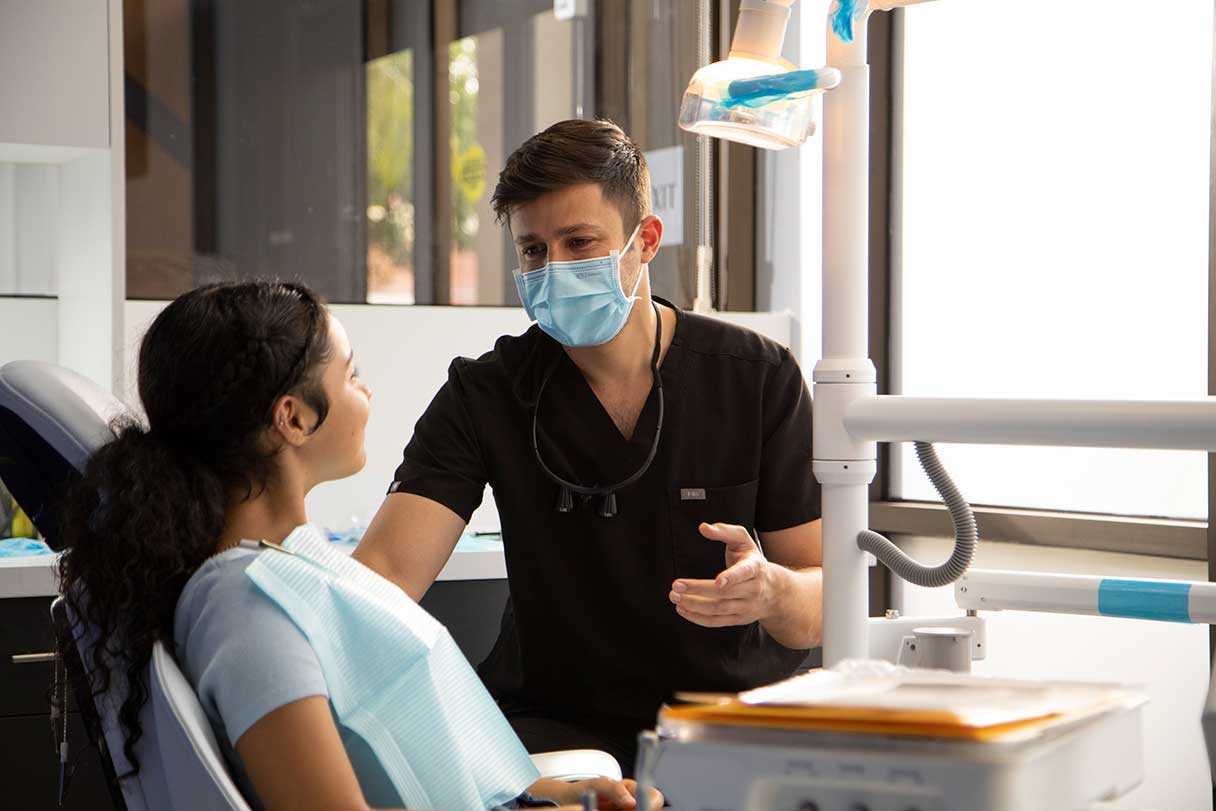Have you ever experienced jaw pain on one or both sides of your face? You might be among the 5% to 12% of the general population who suffer from temporomandibular joint disorder, also known as TMJ.1
This jaw pain or stiffness around the jaw area of the face is also sometimes called temporomandibular joint dysfunction. The temporomandibular joints are located on either side of your face and connect the jaw to your skull. These joints allow you to move your jaw up and down while talking, eating or yawning.2
Here, you'll learn about the causes and symptoms of TMJ, how to get your temporomandibular joint disorder diagnosed and various treatment options for TMJ pain.
What Is TMJ Dysfunction or TMJ Disorder?
Temporomandibular joint disorder is when the lower jaw bone (mandible) moves forward when the jaw opens instead of staying in the socket. It feels like jaw pain, or difficulty opening your mouth, and can lead to headaches as well.
People between the ages of 20 and 40 seem to be the most likely to develop TMJ disorder. This condition is twice as likely to affect women than men.1
Causes of TMJ Disorder
TMJ could be due to a number of reasons, from physical issues to emotional ones. Below are some potential causes of temporomandibular joint disorders.
- Habits: Teeth grinding, clenching, chewing fingernails excessively and even gum chewing can cause TMJ pain.1
- Jaw injury: Whether you got hit in the jaw, underwent a long dental procedure, had a breathing tube in during surgery or you simply overstretched your jaw while eating or yawning, you might find yourself experiencing TMJ pain.3
- Psychological factors: If you're experiencing emotional stress, depression or anxiety, you may feel more pain in your jaw area.3
- Joint diseases: Arthritis in your jaw joint could lead to jaw pain.1
- Malocclusion: The way your teeth bite down together, called occlusion, could be the reason you're experiencing jaw pain.3 This pain can be persistent if your bite is out of alignment and doesn't fit the way it should.1
If you have TMJ dysfunction, it can be exacerbated by the following habits:1
- Sleeping on your stomach
- Clenching or grinding your teeth during the day
- Chewing gum or crunching on ice
- Poor posture that puts pressure on the neck and facial muscles
- Using your teeth to open or tear things off, like tags and strings
- Chewing pens, pencils or other objects
- Taking large bites of food that require you to open your jaw wide
Common Symptoms of TMJ Pain
Jaw pain can feel like different things to different people. It could feel more intense if you experienced an injury — like a punch to the jaw — or more like a throbbing pain if your jaw hurts due to a toothache. In general, TMJ symptoms include the following:
- Pain when you open your mouth2
- Throbbing or aching feelings in your jaw2
- Stiffness in the temporomandibular joints2
- Pain that goes from your chest up to your jaw2
- Pain on one side of the jaw2
- Pain in and around the ear(s)1
- General aching in the face1
- Headaches1
- Clicking or popping in the jaw1
- Locking of the jaw joints, making it more challenging to open and close your mouth1
Schedule an appointment with your doctor, a dentist or an oral surgeon who's a TMJ specialist if you're struggling to open and close your jaw completely or if these symptoms become more severe.
Treatments for TMJ Pain
There are many ways to treat TMJ pain. Some include home remedies to reduce jaw pain, while others involve medications — and some might require a visit to an orofacial pain expert.
The costs of TMJ treatment options vary. If you have dental insurance or health insurance, your doctors' visits might be covered, or you might have a copay. Some health insurance companies don't cover TMJ treatment. If you don't have health insurance or dental insurance, the cost of TMJ surgery can be very high.4
Home remedies3
- Use a cold therapy pack on your jaw.
- Apply a warm compress to the area causing pain.
- Massage your jaw muscles to help loosen them up.
- Rest your jaw muscles by avoiding hard candy, gum chewing and tough-to-eat foods.
- Change your sleep position if you sleep on your stomach, and see if that makes a difference.
Medications
If home remedies don't work, try a pain reliever. You might find relief in using over-the-counter (OTC) medication for TMJ pain.
You might want to make an appointment with a doctor, oral surgeon or physiatrist to learn more about your TMJ treatment options. They might prescribe medications as well, such as:1
- Acetaminophen
- Nonsteroidal anti-inflammatory drugs (NSAIDs) like naproxen or ibuprofen
- Muscle relaxers may be prescribed for someone who clenches their teeth.
- Antidepressants, which can be helpful if your pain is due to emotional stress
| Medication | Average Cost |
|---|---|
|
Acetaminophen |
$65 |
|
NSAIDs |
$166 |
|
Muscle relaxers |
$0 and up, depending on insurance and copays4 |
|
Antidepressants |
$0 and up, depending on insurance and copays4 |
Non-surgical treatments for TMJ
Your dentist might suggest some of the following TMJ treatments for jaw pain before recommending surgery.
- Mouth guard: A mouth guard can help with someone who clenches their jaw or grinds their teeth at night.1 You might want to try an OTC mouth guard at night first.
- Injections: A doctor might offer up a trigger point injection or a corticosteroid injection into tight muscles in your jaw to help relax them.1
- Physical therapy: Getting physical therapy for TMJ disorders can help restore movement. This includes stretching the jaw muscles, delivering hot and cold therapy during a session and providing resistance exercises at home to strengthen jaw muscles.7
- Splints and braces: Your TMJ disorder might need to be treated with dental appliances and orthodontics to realign the teeth and correct misalignment with oral splints, braces or prescription mouth guards.1
| Non-Surgical TMJ Treatment | Average Cost |
|---|---|
|
Mouth guard |
$18 to $338 |
|
Injections |
$0 and up, depending on copays and insurance4 |
|
Physical therapy |
$10 and up with insurance9 |
|
Splints and braces |
Up to $5,000 without insurance10 |
Surgical treatments for TMJ
Getting surgery to help alleviate TMJ pain should be a last-resort treatment. It's more likely to be recommended when a TMJ doctor has ruled out all other options and the patient is experiencing:11
- Disease in the TMJ or a structural issue
- Intense symptoms that aren't going away
- Trouble eating and drinking due to TMJ pain
- No improvement in symptoms after conservative treatments
There are various types of surgery for TMJ disorders.11
| Type of Surgery | What It Entails | Average Cost |
|---|---|---|
|
Arthrocentesis |
Flushing the jaw joint with fluid via a syringe, which can help reduce inflammation |
$300 and up |
|
Arthroscopy |
Performed after the doctor inserts holes into the skin above the joint |
$5,000 and up if not covered by insurance |
|
Arthrotomy or Arthroplasty |
Open joint surgery to repair or reposition the joint |
$5,000 and up if not covered by insurance |
|
Temporomandibular joint replacement |
Complete joint replacement |
$40,000 and up if not covered by insurance |
|
Modified condylotomy |
Cutting the bone to reposition it properly |
$15,000 and up if not covered by insurance |
How to Prevent TMJ Pain
Some TMJ pain can't be helped, like if you experienced a jaw injury, your mouth was open for a long time due to dental surgery or your teeth aren't lining up properly. But some habits and lifestyle factors can be addressed to help prevent TMJ dysfunction and alleviate jaw pain:3
- Don't chew on items like pens and pencils.
- Avoid or reduce gum chewing.
- Take smaller bites.
- Keep your jaw relaxed to avoid clenching your teeth throughout the day.
- Learn stress management techniques.
- Wear a mouth guard or face guard to protect your teeth and jaw from injury when playing sports.1
More Common Questions About TMJ
Do you still have questions about TMJ? Here are answers to some frequently asked questions.
Financing TMJ Treatments With the CareCredit Credit Card
Regular dental checkups are important to help prevent, identify and treat dental problems before they become more advanced. The CareCredit credit card can help you pay for dental exams, cosmetic dental procedures and other costs that insurance doesn't cover — to help you keep your pearly whites bright and healthy.* Apply today and use our Acceptance Locator to find a dentist near you that accepts CareCredit. Make the most of your wellness journey by downloading the CareCredit Mobile App. You can find a provider on the go, manage your CareCredit account and easily access the Well U hub for more great articles, podcasts and videos.
Author Bio
Diana Kelly Levey is a freelance journalist, content marketing writer and author with more than 15 years of experience covering health and wellness.







